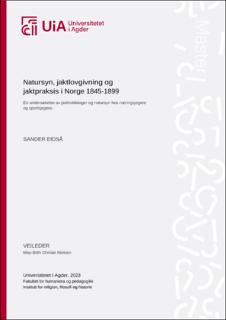| dc.description.abstract | Two of Norway's most influential hunting laws in the 19th century were passed in 1845 and 1899. During this period, hunting in Norway served both as a livelihood for a large part of the country’s population, but also as a recreational activity for sport hunters. Roughly outlined, this created a social and cultural division between (1) traditional food hunters and (2) sport hunters. In this thesis, I examine the hunting attitudes and views of nature held by these two groups of hunters. I will refer to the three most influential hunting laws from the period, from 1845, 1863 and 1899 respectively, to uncover attitudes among hunters, as such attitudes are more likely to be revealed by the changes that the hunting laws represent. I demonstrate that the traditional food hunters’ attitudes towards hunting were strongly influenced by the liberal hunting system in Norway, and other culturally inherited traditions. The sports hunters represented a relatively new hunting-group in Norway, who valued the experiences and recreations that hunting gave them. Furthermore, in the thesis, I argue that the years 1845-1899 represented a period of modernization in Norwegian hunting history. At the start of the period, Norwegian hunters had a distinct anthropocentric view of nature, where actions towards nature were influenced by the perception of nature as merely an arena for human exploitation. During the aforementioned period, the understanding of the need for game protection increased, but anthropocentric views of nature still dominated in the 1860s. Towards the end of the time-period, the sport hunters, experienced a stronger desire to control and own nature, where the widespread belief was that game under a landowner’s control were better taken care of than game without an owner. Although I observe modernized hunting attitudes and a modernized view on nature throughout the period, I also show that illegal hunting was a widespread problem in Norway. In the thesis, I argue that such violations of the law, combined with modernized protectionist thinking, indicate that Norwegian hunters held ambivalent hunting attitudes and views on nature. This, in turn, suggests that the period represented a modernization process that had begun but not been fully realized. | |
